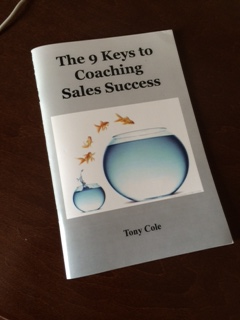It is an important distinction in sales – understanding the salesperson who can sell versus the one who will sell. A recent post by Dave Kurlan, on the Difference Between Selling Skills and Effectiveness does a great job of illustrating that difference. Think about your own business and those who consistently produce beyond the expected. There is something more than just their skills that drive their behavior and success. There is the Will to do whatever it takes to achieve their goals.
Why Sales Coaching Matters
This distinction between the can and will is why sales coaching really matters. Sales training can help develop a new producer so that they understand how to prospect, prepare, qualify and close business. But it is often the Coach who helps that salesperson uncover their will and their desire to sell, who stokes the fires by asking the right questions and helps them establish extraordinary goals. Sales coaching matters because it is personal, based on the salesperson’s situation, drive, hopes and dreams.
Sales coaching is also important to every organization because salespeople reporting to a manager with strong Coaching skills tend to have 26% more closeable late-stage opportunities.
But we also know from the data warehouse of Objective Management Group that less than 10% of sales coaches know the personal goals of their salespeople so while they may be well intended, how can a sales manager coach a salesperson until they know why that salesperson comes to work every day or what compels them to pick up the phone and make that next prospecting call.
Most sales coaches moved up through their company because they were good producers and they because of that, they are adept at translating the how to sell effectively, but may not be as skilled in helping to uncover a salesperson’s will to sell. Sales managers need a coaching system so they know when to coach their salespeople and follow an intentional sales coaching process to make it effective.
Here are 9 Skills in our Sales Coaching Skill Development Plan:
- Debriefs effectively after significant calls
- Effective on joint calls
- Asks quality questions of their salespeople
- Understands the impact of a salesperson’s Sales DNA
- Can demonstrate an effective sales system
- Is effective at getting commitments from salespeople
- Consistently coaches skills and behaviors
- Understands the impact of a salesperson’s Will to Sell
- Effectively onboards new salespeople
Just like salespeople, there are many sales managers who can do the job of coaching – they have the skills, but perhaps are not motivated by achieving success through the development and achievements of others. Those who lead and manage salespeople can lack the will to succeed in sales management. It’s an important distinction for every company to consider as they hire and develop their team.
Find out more about why sales coaching matters: https://blog.anthonycoletraining.com/sales-coaching-skills





.jpg?width=3000&name=pexels-pixabay-264337%20(1).jpg)




